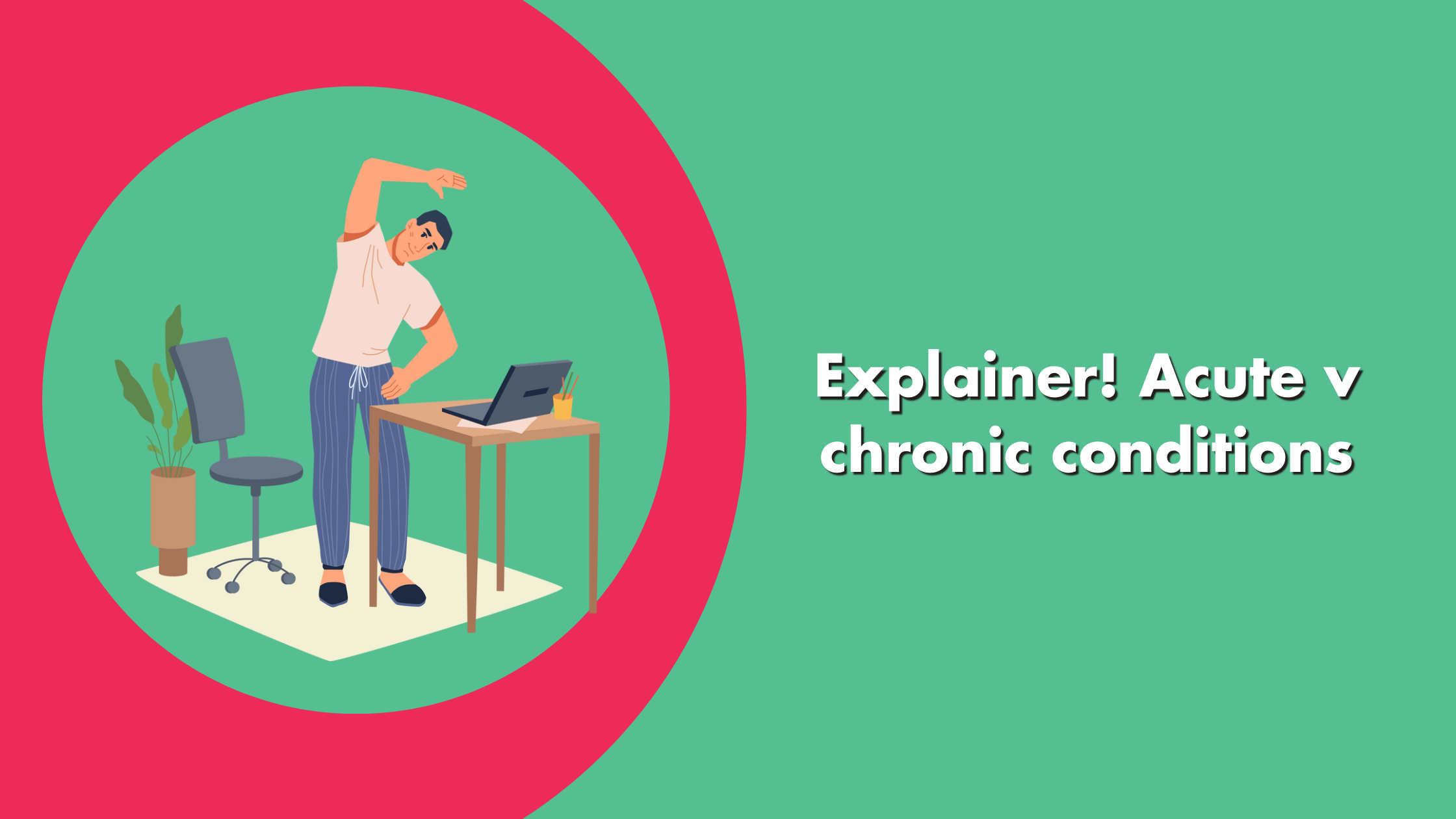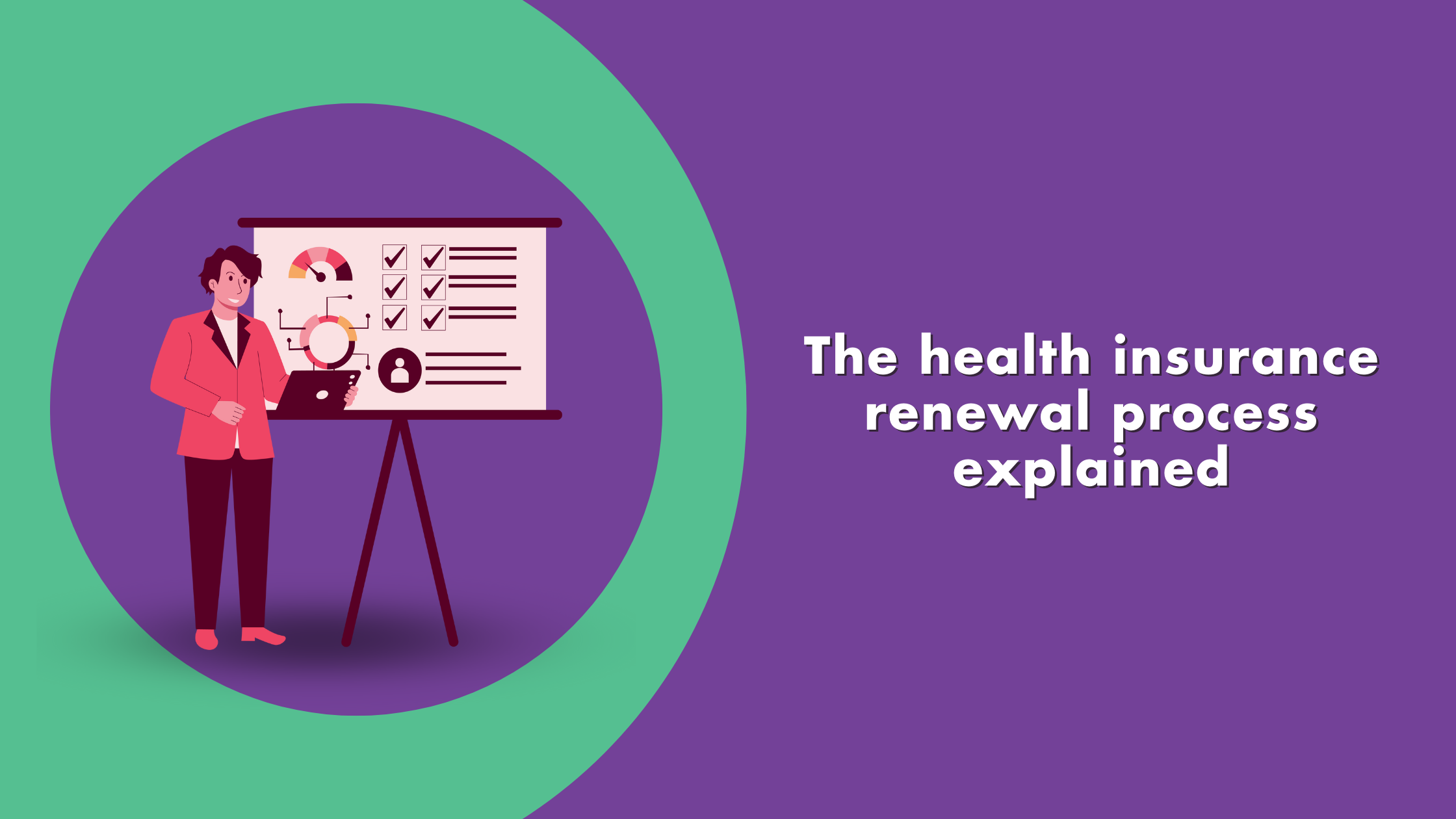Finding out what’s included in a health insurance plan can culminate in squinting through endless small print. One of the key points of contention can be what constitutes an acute v chronic condition, as many policies cover one and not the other.
So, what’s it all about?
We’ve provided a short but sweet explainer on the differences between acute and chronic health conditions, detailing which conditions can be offered under Business Health Insurance, and address some of the key points of contention.
Need help creating the perfect combination of employee benefits for your staff? Contact one of our friendly brokers for FREE on 01273 222805 or click on the bottom right chat box for one-to-one support.
Acute v chronic conditions: what’s the difference?
Acute conditions
An acute condition is an illness which comes on rapidly but will clear up quickly with the right treatment. Some acute conditions can lead to further complications down the line if not treated (potentially becoming chronic!) so it’s important to address them at the earliest possible opportunity.
Examples of acute conditions include:
- Common colds and flus
- Broken bones
- Joint pain (treatable with joint replacement)
- Appendicitis (treatable with removing appendix)
- Hernias
- Infections
- Rashes
- Nausea
- Diarrhoea
- Heart attack
- Burns
- Constipation
- Migraines
Chronic conditions
A chronic condition can last for months, years, or even a lifetime. The conditions can often be difficult to diagnose and treat, and can originate from lifestyle choices or be inherited.
Definitions of what constitutes chronic can vary. And there’s sometimes a grey area between chronic v acute conditions.
Nonetheless, chronic conditions can be identified by one or all of the following characteristics:
- Needs ongoing or long-term monitoring through consultations, examinations and check-ups
- Needs ongoing or long-term control or relief of symptoms
- Symptoms continue indefinitely
- Condition is likely to return
- Condition has no known cure
- Requires rehabilitation or to be specially trained to cope with the condition
Examples of chronic conditions include:
- Diabetes
- Heart disease
- Cancer
- Arthritis
- Asthma
- Psoriasis
- High blood pressure/hypertension
- Stroke
Is cancer chronic or acute?
Cancer has many characteristics of a chronic condition, but most medical insurance providers view cancer as an acute condition subject to underwriting terms. Of course, it’s very unlikely that an insurer will cover a cancer which pre-exists the insurance policy.
Get in touch with one of our independent friendly brokers for FREE expert advice and market-wide quotes related to employee benefits and private healthcare. Call 01273 222805 or drop us an email on hello@hoorayinsurance.co.uk.
What’s all the confusion about?
Most assume the main difference between chronic and acute conditions is rooted in the severity of the condition. However, it’s actually based on the likely outcome for that condition once treatment is undergone.
For example, although one is inherently more severe than the other, both the common cold and heart attacks are classed as acute conditions and that’s because both can respond to treatment.
Where there are clear differences between chronic and acute conditions, there is also space for confusion and crossovers. For example, asthma is a chronic health condition but an asthma attack can be seen as an acute phase of the illness as it can be treated and responded to quickly.
What can health insurance cover?
Business Health Insurance is only really designed to cover acute conditions, not to pay for ongoing treatments. However, it’s worth keeping in mind that the NHS services is always there for health conditions not covered by the insurance policy.
If there are signs of a chronic condition developing, Business Health Insurance will cover clients to see specialists and consultants up to the point of diagnosis. After that, the insurance will stop providing cover for the ongoing care.
Although most Business Health plans cover the standard acute conditions, many insurance providers will also offer accompanying services and support for illnesses, not just preventative treatments! This can include:
- Cancer cover
- Health Screening
- Physiotherapy
- Mental health support
- Wellbeing apps
- Employee Assistance Programmes
- Health Cash Plans
- Discounted gym membership
- Virtual GP services
Any other options for chronic or pre-existing conditions?
Businesses can take out a ‘medical history disregarded’ policy to cover pre-existing conditions. This kind of policy prevents the insurer from delving into your employee medical records, or even discriminate based on your medical history! Naturally, it raises the cost of the insurance (AKA the premium), but it’s a great option to have and is a relatively easy policy to administer.
However, medical history disregarded does not cover chronic conditions.
Check out more here on medical history disregarded policies, and how to implement them.
However, there IS one way to cover chronic conditions: taking out International Private Medical Insurance! This provides staff with a more comprehensive and detailed level of cover, but at a much higher cost.
Find out more about international healthcare here.
Real-life insurer in action: Vitality
“Our business health insurance includes hospital treatment for eligible conditions, cancer cover, and talking therapies. There are options available to further customise your plan. All plans include the Vitality Programme, which motivates your employees by rewarding healthy living.”
Vitality offer up a wide array of services for their business health clients – allowing businesses to build their own cover and policies.
There two core business policies include:
Vitality Small Business
- Primary Care
- Cancer treatment
- Mental Health
- Hospital Care
Vitality Corporate Health
- Primary Care
- Cancer cover
- Mental Health Support
- Rewards and Partners
- Health Assessments
Discover what different insurers are offering for their Business Health cover.
Ask an independent broker
Working your way through the world of employee benefits and health insurance can be hard work, but understanding some of the terminology involved is a good place to start.
Even better is enlisting the help of a qualified employee benefits broker like Hooray, as we won’t spout the usual industry jargon in your direction, instead we’ll relay everything in simple, straightforward language.
Our team of experts offer FREE advice and support to start-ups and SMEs looking to launch their employee benefits or are reviewing existing schemes. We help to get things started, taking the time to understand your business needs and what it is you are looking for.
And we never charge you a penny for our services!
Contact our award-winning friendly advisors for advice at hello@hoorayinsurance.co.uk or call 01273 222805.
Author

Author: Eleanor Chilvers








![_HPA24 Advice Firm of the Year [YELLOW] _HPA24 Advice Firm of the Year [YELLOW]](https://hoorayinsurance.co.uk/wp-content/uploads/elementor/thumbs/HPA24-Advice-Firm-of-the-Year-YELLOW-qwfw5zs3ef19fjq6cnwf697rj9gwqbf8o6443qptg0.png)
![_HPA24 Best Small Health Insurance Advice Firm [YELLOW] _HPA24 Best Small Health Insurance Advice Firm [YELLOW]](https://hoorayinsurance.co.uk/wp-content/uploads/elementor/thumbs/HPA24-Best-Small-Health-Insurance-Advice-Firm-YELLOW-qwfw5yu97kzz3xrji5hslrgaxvljimbic1gmmgr7m8.png)
![_HPA24 Best Sales & Retention Advice Team [YELLOW] _HPA24 Best Sales & Retention Advice Team [YELLOW]](https://hoorayinsurance.co.uk/wp-content/uploads/elementor/thumbs/HPA24-Best-Sales-Retention-Advice-Team-YELLOW-qwfw5yu97kzz3xrji5hslrgaxvljimbic1gmmgr7m8.png)
![_HPA24 Best Small Protection Advice Firm [YELLOW] _HPA24 Best Small Protection Advice Firm [YELLOW]](https://hoorayinsurance.co.uk/wp-content/uploads/elementor/thumbs/HPA24-Best-Small-Protection-Advice-Firm-YELLOW-qwfw5zs3ef19fjq6cnwf697rj9gwqbf8o6443qptg0.png)